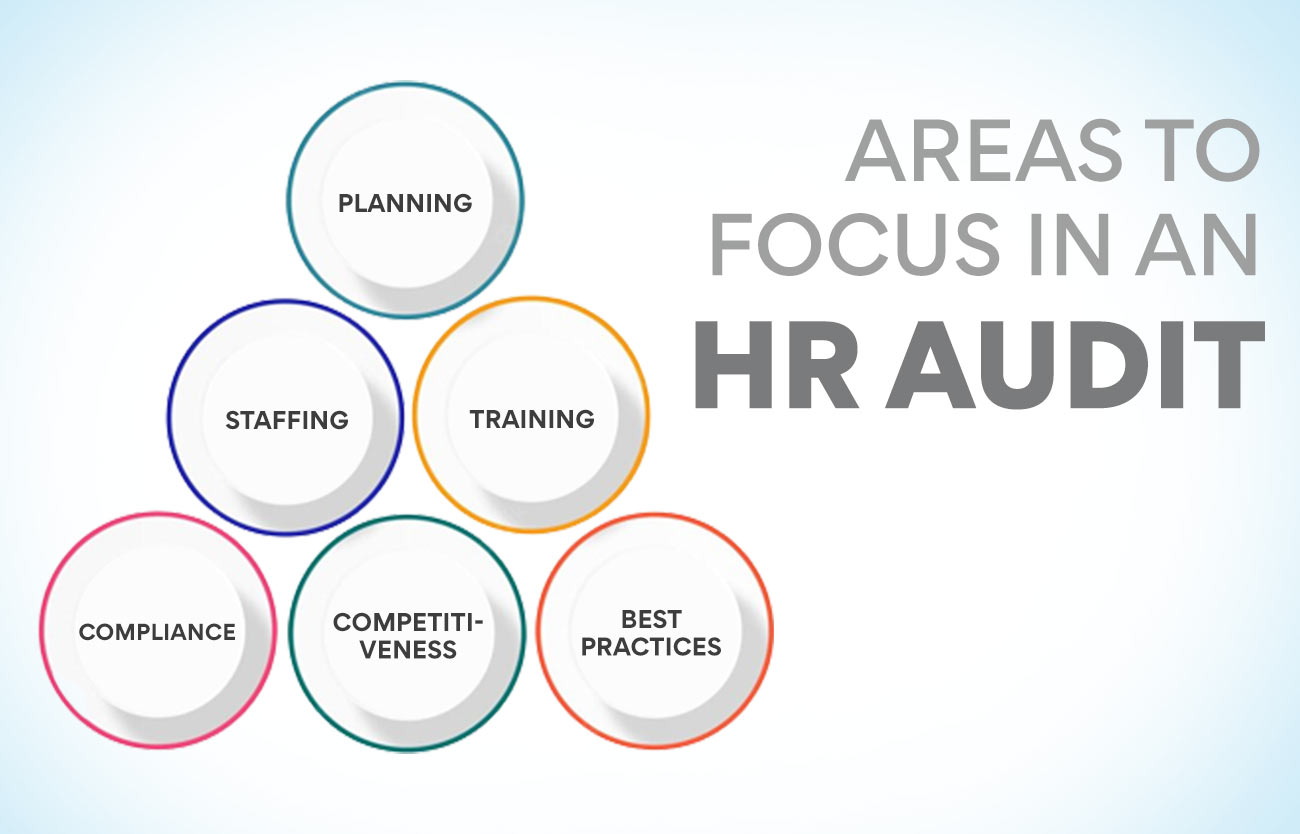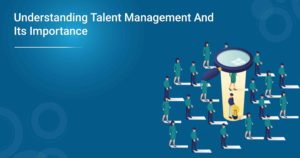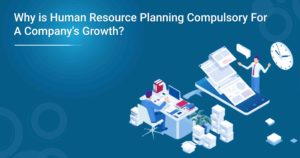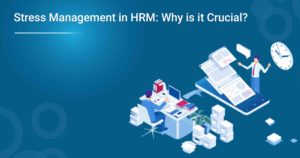A company must know its strengths and weaknesses, and this is especially important in the case of human resources. The people of a company are its biggest assets, and the management must know if their HR policies are correct. The firm must ensure that all HR activities are being executed properly and in a way to keep workers happy. A satisfied workforce is crucial for an organisation’s success, and an HR audit is the best way to ensure this.
Those planning to become HR professionals will benefit greatly from attending the Post Graduate Certificate Course in Human Resource Management conducted by reputed institutions. You can learn more about the course by visiting our website.
What Is An HR Audit?
Before we understand HR audit, it is worth knowing the activities of the HR department. The human resource department handles anything related to the employees of a company. An audit evaluates all these functions, their processes and policies. It is not a mandatory process like a financial audit, but most companies do it as their success depends on good HR management.
An HR audit has many purposes:
- It helps the firm remain compliant with the laws governing human resources.
- Enables the HR department to improve its performance
- Companies can review and allocate necessary resources for HR
- Organisations do it as an act of due diligence for future investors and stakeholders
- The audit makes future improvements possible.
Also Read: Advanced HR Tools That You Should Know
How To Conduct An HR Audit?
The process is expected to bring the company many benefits by improving the conditions of the employees and retaining them. This is why firms must do it properly. Firstly, there must be a clear HR audit objective. Some of the goals achieved by conducting this exercise are as follows:
- This process helps to rectify the mistakes made by the HR personnel while performing their duties and to take corrective measures quickly.
- The exercise finds out whether the officials carry out HR functions as per the policies and procedures of the company.
- It evaluates the function of the HR department concerning recruitment, training, promotion, workplace environment, grievance redressal, etc. and checks whether these are done per the firm’s policies.
- An HR audit finds out areas where cost-cutting is possible.
- It makes the employees maintain discipline and perform as required in their position.
One needs to expand the goals beyond what is mentioned above. The objectives will differ from company to company. The HR department should sit with the top management and decide on the goals they should achieve by doing this exercise.
Areas To Focus In An HR Audit
- Planning
Planning is very important as far as people management is concerned. The HR department must forecast staffing requirements promptly. It will ensure that work doesn’t stop due to the non-availability of staff members. The HR audit will help determine if HR officials evaluated the employee requirements on time and if they took necessary action to fill the upcoming vacancies. If any delay is observed, it will help the department take necessary action to ensure that human resource planning is done on time. The audit can analyse if the required people are available in all departments.
- Staffing
Staffing happens through selection and recruitment. The HR audit will determine if the selection of candidates is correct for the position. The exercise helps to know the source of such candidates and whether the firm followed the proper processes to find the best people for the job. Recruitment is another important function of the human resource department. The audit can determine if the correct recruitment procedures, per company policies, were followed when hiring people. The auditors can evaluate the correctness of the selection of people by assessing their performance.
- Training
Training is crucial for the development of the employee and the organisation. Every staff member must have access to training programmes to help them advance in their careers. Those conducting the HR audit must ascertain whether the organisation provided proper training to workers to make them capable of handling their present and future responsibilities. The auditors must also see if the money spent on training has given the desired returns. They must also check if there are policies about training and whether the procedures are followed accordingly.
- Compliance
All companies need to adhere to the laws governing employment and employees. The central and state governments announce laws and amendments from time to time, and all organisations must follow these rules. Any deviation can attract hefty fines. An HR audit must look at whether the firm is following all the laws and if the HR personnel are familiar with the latest ones. It helps to mitigate the risks of fines and lawsuits. The auditors must also ensure compliance with the company’s worker policies.
- Competitiveness
A company must be competitive with its products and also when it comes to attracting good talent. Good employees are the key to an organisation’s success. It should be able to attract those who are most suitable for the position. Various factors make a firm attractive to prospective employees. Attractive salaries, lucrative benefits, good working conditions, growth prospects, etc., are what people consider when joining a firm. The HR audit must see if the policies help recruit the best people in the market.
- Best Practices
One must evaluate whether the HR department is following the best practices adopted by other industry companies. It is essential to assess whether the company’s policies align with accepted industry standards. This helps to ensure that the firm is on track when it comes to job descriptions, employee handbooks, employee assessment methods, etc. It is vital for a growing company because these policies help retain employees and attract the best people in the field.
You can learn more about the scope of an HR audit from the Post Graduate Certificate Course in Human Resource Management. More information about this course is available on our website.
Steps In An HR Audit
The HR audit must be conducted systematically if it should yield the desired results. As it is a process that takes time and people, it is best to make sure that it is a success. Here are the steps that this exercise must follow to achieve its objectives.
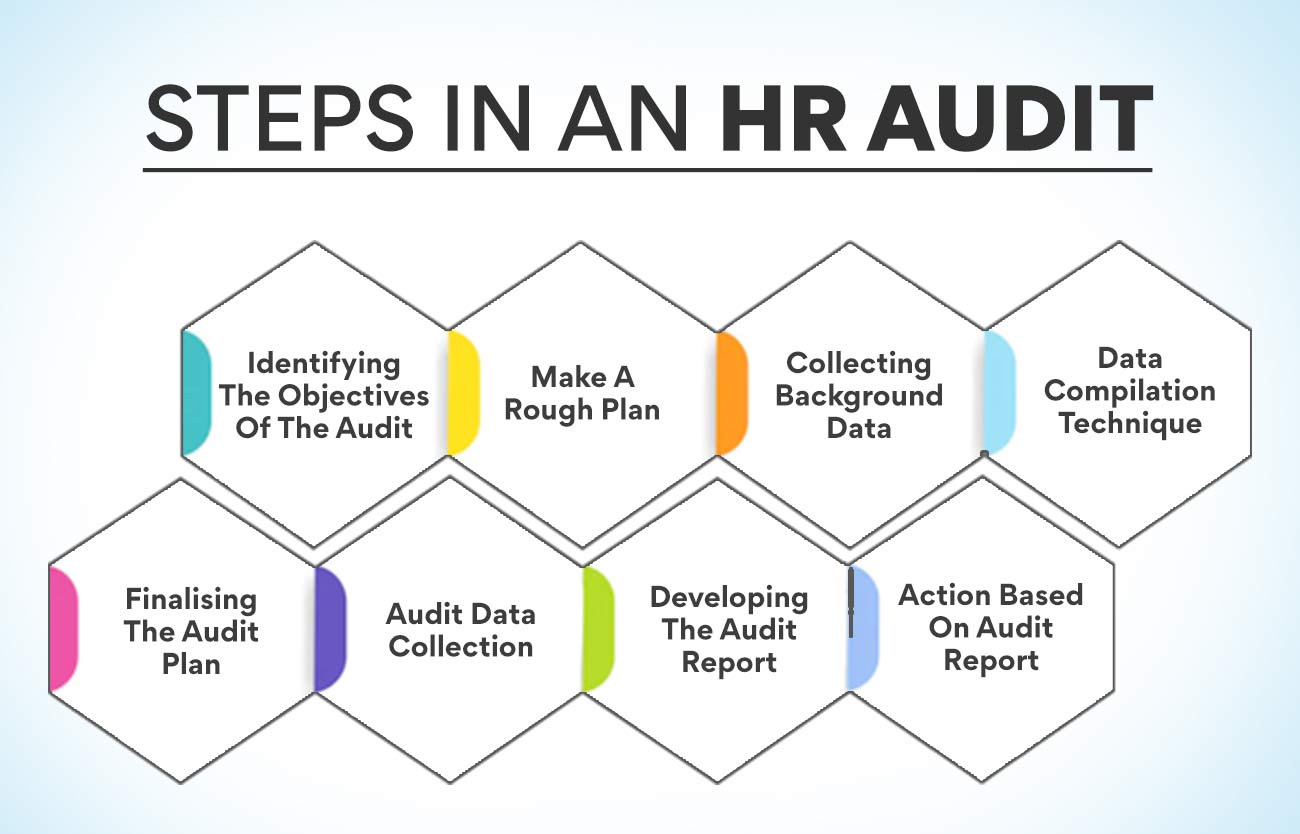
- Identifying The Objectives Of The Audit
Though the goals of an HR audit are similar for most companies, there can be many aspects that are unique to a particular industry or organisation. The audit team must identify the objectives and ensure that the planning and schedules are aimed at achieving these goals. They must also be in line with the overall objectives of the establishment.
- Make A Rough Plan
Before starting the actual audit process, the team leader must have a rough plan. The auditor needs to ascertain the manpower, money and equipment requirement for completing the audit successfully. This will also help inform the top management about the efforts involved in the process and get their permission.
- Collecting Background Data
The persons conducting the audit must collect all the necessary information that is required for conducting the HR audit successfully. This will include the data about the internal competency level of the organisation. The auditor must also understand the legal environment within which the firm is operating.
- Data Compilation Technique
Collecting data from the employees is very important for a successful HR audit. The audit team must decide on the method of collecting such data. They can issue a questionnaire for the workers to answer. Another method is to have interviews with some key members to collect information about HR functioning.
- Finalising The Audit Plan
This is the stage at which the rough plan can be amended if needed. Any additions to the plan must also be made now. The background data collected will be useful in making amendments to the plan. The team must sit together and finalise the plan before moving ahead.
- Audit Data Collection
In this step, the actual collection of data from various sources is conducted. The auditor must compile all the information and arrange it in a manner that can be used beneficially. The team leader must make sure that all the data, as per the HR audit plan, has been collected and compiled.
- Developing The Audit Report
Once all the information has been collected, an assessment is done of the various functions of the HR department. The auditor generates a report on this basis. Simultaneously the team also observes the functioning of employees and the working atmosphere and evaluates them. The report is submitted to the executives.
- Action Based On Audit Report
This is the final stage when the management studies the report and takes action on it. The executives might seek the recommendations of the audit team for making the changes as per the report. This helps the organisation make the right decisions about its HR management.
Benefits Of Conducting An HR Audit
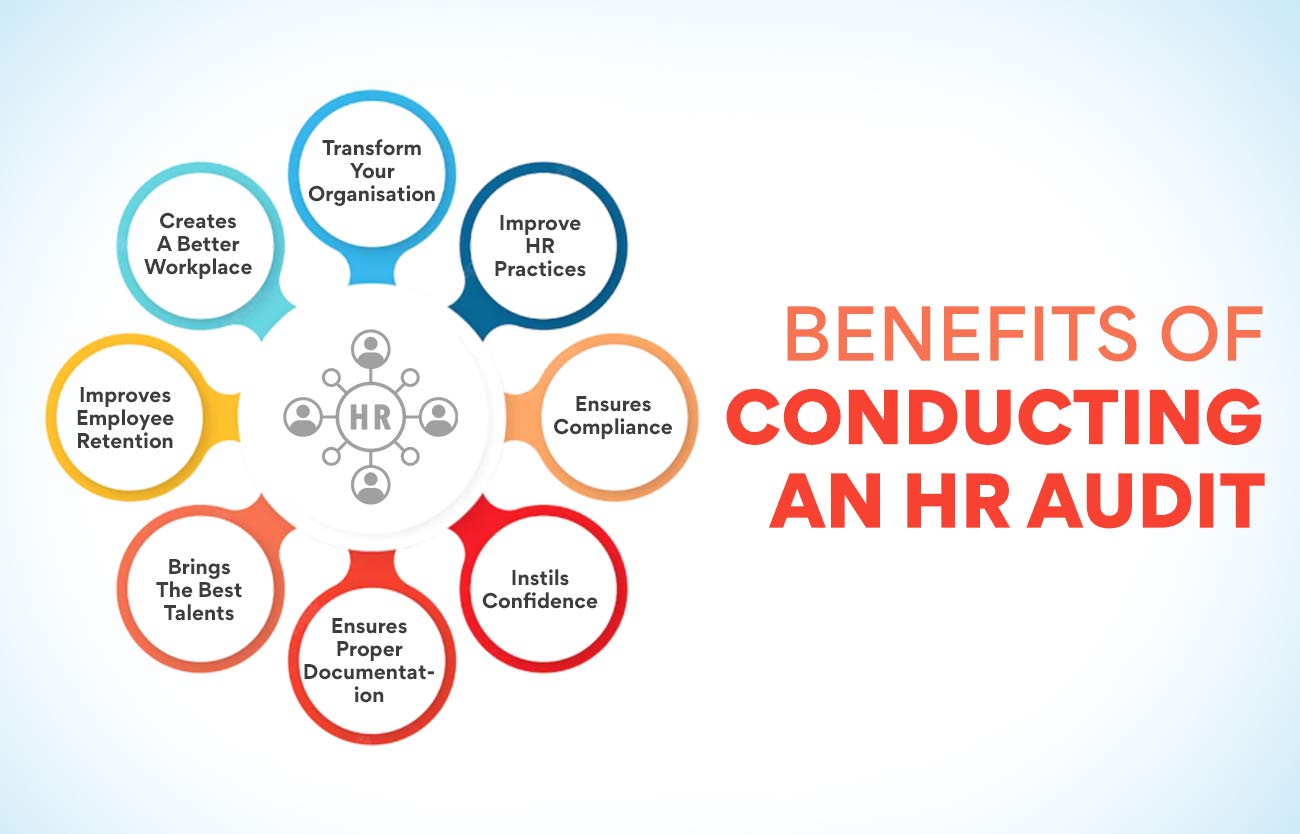
Transform Your Organisation
The audit helps in pinpointing the areas in the organisation that needs to be improved. It can help optimise manpower resources and improve the returns on investment. It is possible to know the reasons for low productivity and correct them. It is possible to improve communication and data collection systems using this audit.
Improve HR Practices
An HR audit compares the current HR practices of a company with the industry standards. This helps to improve the functioning of the department and get on par with others. HR teams can learn to prepare better employee handbooks, prepare more attractive severance plans, and make exciting job descriptions to attract the best people to the company.
Ensures Compliance
Complying with labour laws can save a lot of money and effort for the firm. Any failure to abide by the rules can result in penalties and lawsuits. The audit will help the company keep abreast of the latest changes in regulations and ensure compliance.
Instils Confidence
The HR department must be able to function with confidence. An HR audit will help them improve their performance and be on par with the best practices in the industry. It instils confidence in the human resource personnel and helps them function more efficiently.
Ensures Proper Documentation
Proper documentation is crucial when it comes to keeping a tab on your employees in various aspects. It is not easy to ensure that all the files pertaining to the workers are maintained properly. The audit finds out any deficiency in the documentation and helps the company correct the mistakes.
Also Read: How to Overcome Challenges in HR Profession?
Brings The Best Talents
An HR audit keeps the company competitive when it comes to employee benefits and working conditions. It helps the firm know where they are falling short in comparison to others in the industry. Correcting the drawbacks helps attract the best talents to the organisation.
Improves Employee Retention
Employee retention is very crucial for making a company achieve its goals. The assessment of HR functioning can help find reasons for employees leaving the firm. The organisation can make changes that will ensure that employees remain there and contribute to its success.
Creates A Better Workplace
It is necessary for every company to provide a good working atmosphere if the employees must be efficient and loyal. The HR audit helps to find out areas that need improvement. The HR department can know about any safety issues because of faulty equipment or discrimination of workers. These can be corrected, and the working environment can be improved greatly.
It is easy to understand more about the advantages of conducting the audit by joining a Post Graduate Certificate Course in Human Resource Management. Visit our website to understand more about this course and the topics handled in it.
Conclusion
Even though it is not compulsory to conduct an HR audit, more companies are undertaking this exercise because of the immense benefits it offers. The company can provide the employees with a much better environment and ensure their loyalty. Aspiring HR professionals must learn the process and take the initiative to perform the audit in their firms.
More Information:
Areas of Emphasis: Human Resource Management
Difference Between Personnel Management And Human Resource Management







